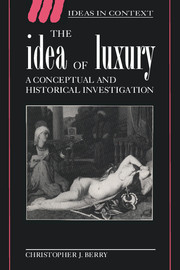4 - The Christian contribution
Published online by Cambridge University Press: 01 June 2011
Summary
In the OED, the first meaning of ‘luxury’ is lust or lasciviousness and a line from Chaucer's Man of Law Tale – ‘O foule lusts of luxurie’ – is cited. If, however, that line is looked up in the Penguin edition, it is given as ‘Foul lust of lechery’. Since the latter is a modernised edition, this says something about the meaning of ‘luxury’ in the fourteenth century. It is this meaning, the interchangeability of ‘luxury’ and ‘lechery’, that I wish briefly to examine. In French, the connexion is more evident with luxure remaining the standard translation of ‘lechery’ or ‘lewdness’ (Chaucer's own usage is itself probably indicative of the relative closeness of the two languages at that time). In part, this examination serves to illustrate the breadth of meaning possessed by the term in pre-modern discourse. This meaning goes back far beyond Chaucer. It has its roots, as we would expect, in Roman usage but it is in the early Christian era that these roots bear this distinctive fruit. It is, accordingly, the chief purpose of this examination to acknowledge the ‘Christian contribution’.
This acknowledgement has its place not simply to fill a gap (even in this study which is not designed as a comprehensive historical survey) but also because without it the fact that late seventeenth- and eighteenth-century theorists had to struggle intellectually to articulate a more neutral view of luxury would seem hard to comprehend.
- Type
- Chapter
- Information
- The Idea of LuxuryA Conceptual and Historical Investigation, pp. 87 - 98Publisher: Cambridge University PressPrint publication year: 1994
- 1
- Cited by

